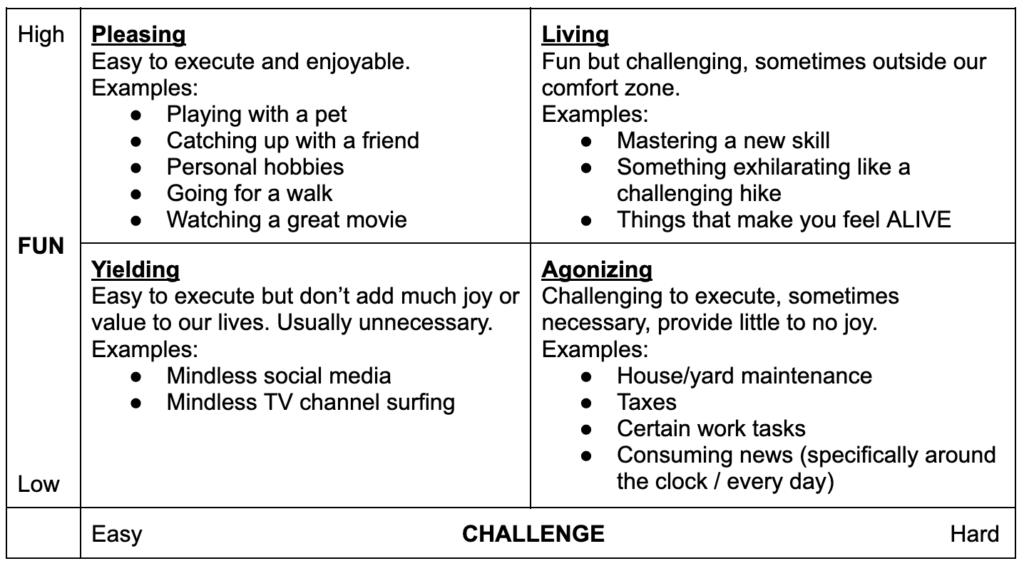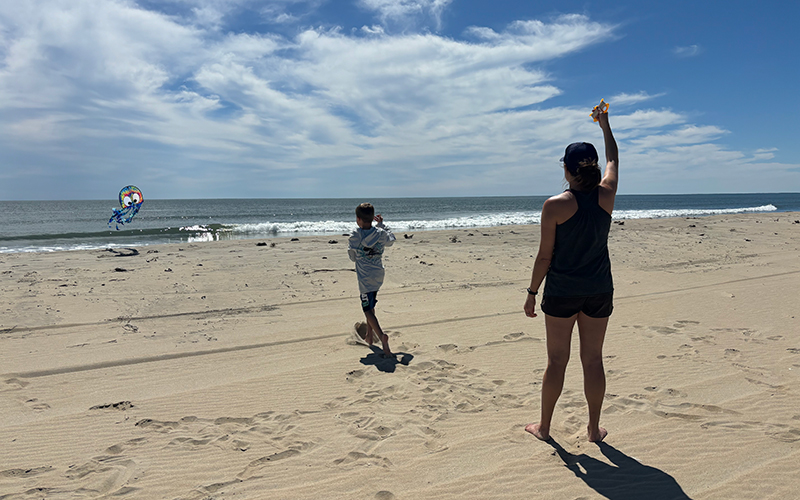The first book I picked up was The Fun Habit: How the Pursuit of Joy and Wonder Can Change Your Life by Dr. Mike Rucker. Mike is an organizational psychologist and a charter member of the International Positive Psychology Association. He explains how intentionally adding more fun into our daily lives can make us healthier, more joyful, and more productive.
This certainly isn’t news to me. I know from my own experience how much more energized and creative I feel after a weekend of camping vs. a weekend of chores or time on the computer.
You’ve probably had similar experiences – whether it’s doing outdoorsy stuff like me, or simply catching up with an old friend or engaging in a fulfilling hobby. The result of taking time for fun is that you end up feeling happier and more fulfilled, with more energy to tackle whatever life throws at you. Problems seem less daunting, and possibilities and solutions you couldn’t see before open up.
So why is it so dang hard to prioritize fun every day? I’ve touched on the cultural conditioning that teaches us to diminish the importance of fun in previous posts. Especially in America, we tend to put work above all else, almost never taking time to fully recharge our batteries.
Mike agrees, and explains that as adults, we face three obstacles: 1) we believe that fun is childish or inappropriate 2) we don’t see the mental and physical benefits of fun and 3) we’re discouraged by the “counter-intuitive fact that fun for busy adults requires discipline, which sounds… well, not fun.”
The Fun Habit teaches practical ways to effortlessly build fun into your daily life – not just something you do on vacation or the occasional weekend you decide to let yourself off the hook. It’s about starting small – similar to the method of micro-habit building made popular by the book Atomic Habits, by author James Clear.
Two exercises that Mike suggests for building a Fun Habit are:
- Do an audit of the fun you are currently having in your life
- Create what he calls the “Fun File” of activities you can schedule or spontaneously choose to deliberately have more fun
The Fun Audit Exercise
Mike admits the word “audit” is about as un-fun a word as any, but explains it as an important step in understanding where you are now, so you can make conscious changes to incorporate more fun into your life. Mike promises that doing this audit will “uncover hidden opportunities to increase your fun, without sacrificing productivity.”
While I haven’t done my own fun audit yet, I have observed how much fun I wasn’t having up until about a month or two ago. I’ve also noticed on days when I haven’t been intentional about scheduling my time, the day gets away from me and suddenly it’s 8:00pm and I’m left feeling depleted from a decidedly un-fun day.
I’ll be doing my fun audit over the next couple of weeks. Mike only suggests a week, but this upcoming week I have a major commitment that is out of my normal routine (the Salida Art Walk), so it feels appropriate to take some extra time for this. I’ll report back!
Why You Need a Fun File
A Fun File is a list of fun activities you can reach for you when you’re scheduling your week and want to add more fun, or when you find yourself reaching for your phone when you’re tired or bored and don’t have the mental energy to come up with something better to do.
It might sound a little silly to have to rely on a Fun File, but I know for me how many times it’s felt easier to choose to sit on the couch and scroll Instagram, instead of thinking of something more playful or satisfying to do. Having a go-to list of ideas can make implementing fun easier, especially on those long days when making time for fun feels hard.
How to Build Your Fun File
Here are the steps Mike suggests for creating your Fun File:
- Brainstorm
Write down everything from your past and present that brings you (or has brought you) joy or felt fun. Then repeat with the future in mind – what things might bring you enjoyment and pleasure in the future? What have you never done but might like to try? - Add Structure
As I mentioned before, reducing the mental load of having to think of ideas for fun makes it more likely you’ll actually be successful at having fun. This becomes easier when you can organize the ideas you brainstormed. Sort your activities into categories (such as activity type, cost, difficulty to do, time of year, etc). - Create a Short List
Pick your favorite 8-15 achievable choices as your go-to fun ideas in the upcoming months. Having hundreds of ideas will create overwhelm or “overchoice”, and is a recipe for NOT fun. Mike compared this to having 1000 movie choices vs. just 10. As my husband will attest to, I’m TERRIBLE at choosing a movie on Netflix, because there are just too many choices. I’ve been known to spend over an hour trying to decide, and then we never even end up watching a movie. This is exactly what can happen if you have too many ideas for having fun, and why you should pare your list down!
The PLAY Model
Another part of the book I loved was the PLAY model, which breaks down the four main ways we spend our time:

When brainstorming for your Fun File, you can vet activities by determining whether they fall into one of the top two quadrants – Pleasing and Living. It’s important to have some of each – some that are easy and some that are challenging.
I’m just getting started with creating my Fun File, but here are a few activities that I’ve already brainstormed – feel free to borrow these when you’re brainstorming, if that’s helpful (but make sure they feel authentic to you)!
Pleasing:
- Going for hikes around our new town
- Trying a new recipe
- Planning our holiday travel (setting a time limit though, as I have a tendency to go down the rabbit hole of having to figure it ALL out in one sitting, which leads to a lot of NOT fun!)
Living:
- Exploring abstract palette knife painting
- Going to the desert to mountain bike a new challenging trail
- Taking a dance class (I enjoy dancing but anything with structure or complicated steps intimidates me)
I’ll share my completed Fun File soon. I’m excited to have a go-to list that helps me be more intentional with having fun every day!
So I want to hear: off the top of your head, what activities can you think of to potentially put in YOUR fun file? Share in the comments!

